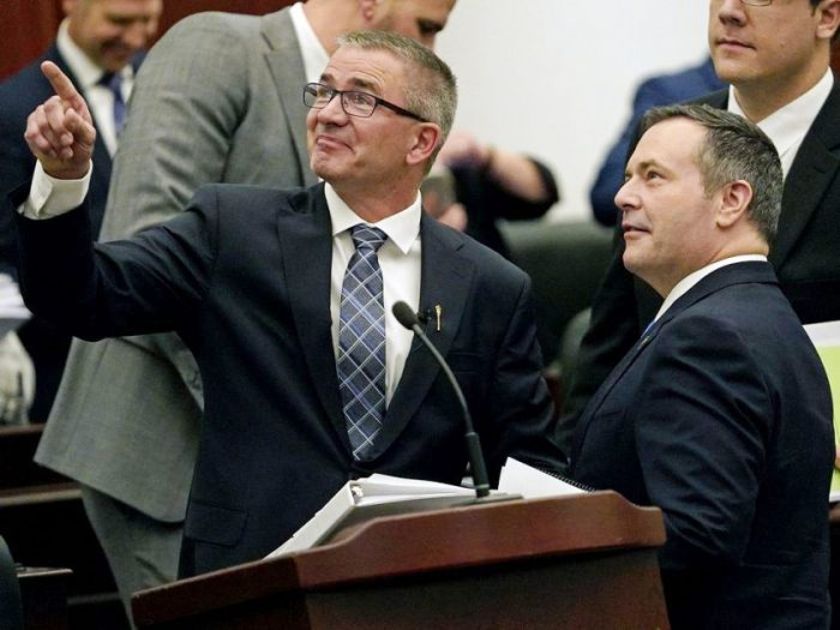What does the UCP’s provincial budget mean for Alberta universities?

Finance Minister Travis Toews (left) and Premier Jason Kenney (right) after Toews delivered the UCP’s 2019 budget speech in the Alberta Legislature. Photo courtesy of Postmedia
By Nathan Woolridge, News Editor
The United Conservative Party (UCP) recently announced its 2019 provincial budget, which saw some concerning slashes to universities and the likeliness of tuition increases for students.
Jason Kenney and Finance Minister Travis Toews announced the budget on Oct. 24 and some Albertans, including students, were not happy. The budget eliminates the education tax credit and tuition tax credit, which were implemented by the previous New Democratic Party government.
“The inevitable tuition hikes will be challenging for students, doubtless forcing many to take out bigger student loans,” Postmedia columnist Don Braid wrote. “There’s a petty whiff of payday loan about this. These loans are already a debilitating burden for many graduates, often for years after they finish school.”
Toews said the UCP wants to “ensure better outcomes for our post-secondary students. Post-secondary education accounts for nearly 11 per cent of our budget.”
“Spending on post-secondary education has grown at a rate of four per cent per year – three times the rate of enrollment growth. We spend $36,500 per student, per year. That’s $5,000 more than British Columbia, $10,000 more than Quebec, and $15,000 more than Ontario,” Toews added in his 2019 budget speech.
Toews added the Minister of Advanced Education is working on consultations with post-secondary institutions in order to set a new course that focuses on “performance, accountability and cost management.”
“Our post-secondary institutions will help hone the next generation of great leaders, and education is one of the best personal financial investments you can make,” Toews said.
The UCP also announced they will end the five-year tuition freeze and decrease institutional dependence on taxpayer dollars. He adds that his government will “maintain a high level of student support through scholarships and endowments.”
The decision to remove the five-year tuition freeze seems to come from the idea of creating competition between universities in the province.
“Removing the cap on tuition will incent our universities and colleges to compete for enrollment by focusing on the delivery of programs that directly meet student needs,” Toews said.
“The 2019-23 Fiscal Plan states that tuition fees are permitted to increase by up to seven percent per year for the next three years. Those with student loans will now pay prime plus one percenton interest, tuition and educationtax credits have been eliminated, post-secondary funding will see cuts and the Summer Temporary Employment Program for students will be eliminated,” says Shayla Breen, the president of SAMRU’s Representation Executive Council.
In an email sent to SAMRU members, Breen encourages members to engage in conversations about the budget to learn more.
“In the coming weeks, you may hear a lot of speculation from the media, staff, faculty and community stakeholders on what the budget will mean for students at MRU. We encourage you to engage in dialogue with your peers, check people’s sources and please reach out to your representatives here at SAMRU; we want to know how you perceive the changes to post-secondary could affect you.
“The tuition decision at MRU rests with the Board of Governors, of which VP Student Affairs Kainat Javed and I are voting members. We will bring your concerns directly to the decision-makers as your representatives,” Breen says.
MRU President and Vice- Chancellor, Tim Rahilly, also weighed in on the new budget saying that the university will “adjust while preserving the quality of students’ programs and services and ensuring access for Alberta learners.”
“Mount Royal is proud to serve the Calgary community, and through our operations and our graduates, we are an important contributor to the local and provincial economy,” Rahilly said. “We understand that Alberta faces difficult economic choices as reflected in today’s budget. Mount Royal is committed to improving the delivery of advanced education in Alberta.”




